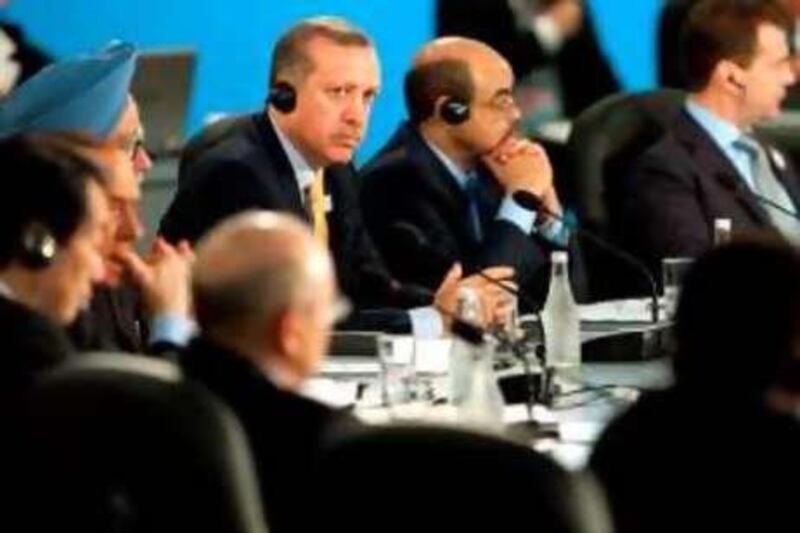ISTANBUL // The United States, worried about the bitter row between Israel and Turkey in the aftermath of May's deadly flotilla confrontation, is stepping in to mediate. Turkey's prime minister, Recep Tayyip Erdogan, said after his return from the G20 summit in Canada over the weekend, that the US president Barack Obama said he would raise the issue with Benjamin Netanyahu, the Israeli prime minister, in a meeting in Washington on July 7.
Turkish diplomats say there has been no direct contact between the Turkish and the Israeli governments since a stormy telephone conversation between Ahmet Davutoglu, the Turkish foreign minister, and Ehud Barak, the Israeli defence minister, immediately after the attack on the Gaza ships. On May 31, Israel sent soldiers to prevent the Gaza flotilla, led by a Turkish Islamic charity, from reaching its destination. In a dawn attack in international waters, eight Turkish activists and one Turkish-American on board the main ship of the flotilla, the Mavi Marmara, were killed by Israeli soldiers. Israel has accused the activists of triggering the violence by attacking the troops and has rejected calls by Turkey and others for an international inquiry into the incident.
Ankara recalled its ambassador from Israel in response to the incident and has pushed for international condemnation of the Jewish state. It has also denied Israeli military planes permission to use Turkish airspace. Although no one expects a sudden improvement in relations between the two countries any time soon, Turkey and its most important ally, the United States, are convinced that an irrevocable breakdown in Turkish-Israeli ties would not be beneficial, say analysts. According to press reports, Mr Obama said the US was "uneasy" about the strained relations between Turkey and Israel.
"No one wants to wreck the relationship," a high-ranking Turkish diplomat, speaking on condition of anonymity, said this week. "Efforts are needed to overcome this situation." Mr Erdogan had praised US efforts that ensured all Turkish activists on board the intercepted Gaza ships could return home one day after the event. "Thanks to very intense efforts by the Americans, the people who had been held in prison were delivered to us within 24 hours," Mr Erdogan told the Toronto Star newspaper during the G20 summit, according to the English text of the interview made available by Mr Erdogan's office in Ankara yesterday.
"So I am very grateful to President Obama for his intervention," the prime minister said. "If it hadn't been for this very speedy response on the part of President Obama, things could have been more problematic." According to press reports, the prime minister told Mr Obama about the findings of Turkish forensic experts, who concluded that the nine people killed in the incident had been hit by 30 bullets.
Lawyers representing the victims' families, also citing the forensic reports, accused the Israelis of a shoot-to-kill approach during the operation. "The findings make it clear the Israeli forces shot to kill the activists and not to overpower them," one of the lawyers, Yasin Divrak, told the AFP news agency. Turkey has said repeatedly that relations with Israel would only improve if the Netanyahu government issues an apology, pays compensation to the victims' families and accepts an independent and transparent inquiry. Ankara also wants the Gaza blockade by Israel to be lifted completely. Israel has eased some restrictions for goods entering the zone, but has not abolished all of them.
The Turkish Star newspaper, quoting unnamed Israeli diplomats, reported yesterday that Israel may be willing to issue an apology to the relatives of some of the people killed on the Mavi Marmara. Talks about compensation payments were also possible, the newspaper quoted the diplomats as saying. There was no official confirmation of the report. Even though he has severely criticised the Netanyahu government and accused it of "state terror", Mr Erdogan has made it clear that his country does not regard the crisis as a complete rupture with Israel, a country with which Turkey has had close relations for decades.
One reason the Turkish side has been careful not to burn all bridges is that Ankara wants to be a regional power broker in the Middle East, and feels it will not be able to play that role if it does not have a reasonably sound working relationship with all countries in the region. Another reason for Turkey's caution is its close defence co-operation with Israel. Earlier this year, Turkey bought 10 Israeli Heron drones for US$180 million (Dh660m). Vecdi Gonul, Ankara's defence minister, has said he does not expect any negative fallout for the deal after the Gaza ship crisis. The drones are expected to be used in Turkey's fight against Kurdish rebels.
Turkish diplomats say the government is still looking at which contracts with Israel may be cancelled in the event that the Jewish state does not offer an apology and continues to reject Turkey's other demands. It is not clear how long Turkey is willing to wait for some kind of signal from Israel. Meanwhile, Ankara's immediate concern is the return of the ships of the flotilla, which are still in Israel.
tseibert@thenational.ae





